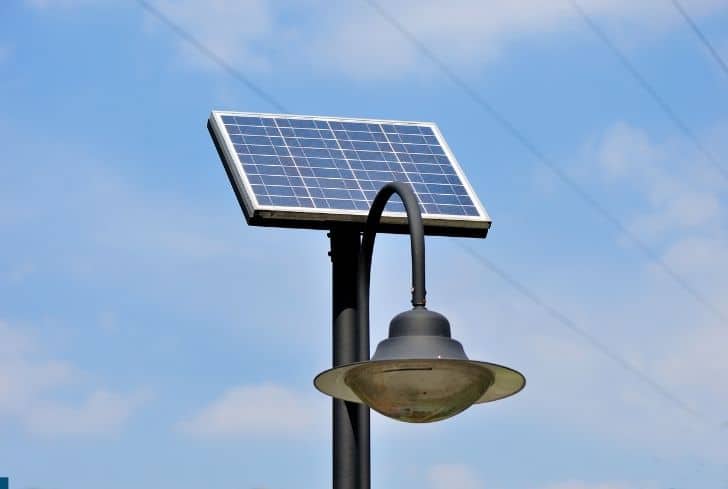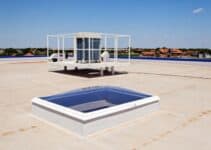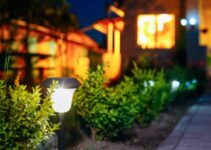In a world where everyone is clamoring for green alternatives and reducing our environmental footprints, solar lights have increased in popularity in recent times among property owners.
They are a much more affordable option with the ever-increasing electricity bills, and they also provide excellent lighting. Yet, a common question posed by the majority is – can solar lights catch fire?
It isn’t untrue as solar lights are at risk of catching fire but rarely do. If you would love to get a more detailed answer, keep reading to discover when a solar light might catch fire and how to prevent the occurrence. So, dive right in!
Can Solar Powered Lights Catch Fire?
Yes, solar lights can catch fire, but the chances of it catching fire are meager. Solar-powered lights emit heat, which is relatively low compared to regular lightbulbs. Hence, this heat isn’t enough to cause your solar lights to catch fire.
You might wonder then, how can solar lights catch fire? There are several ways solar lights can catch fire, we’d discuss that as we move on, but the most common reason is the batteries of your solar lights.
Most solar lights use lithium-ion batteries, which are incredibly volatile and could easily catch fire when overheated or punctured.
In most cases, thrifty property owners might find themselves in this situation due to purchasing cheap or inferior solar lights, which increases the risk of overheating and catching fire. Hence if you plan to buy some solar-powered lights, it is recommended to purchase quality and stay away from cheap solar lights.
Can You Leave Solar Light On All The Time?
Generally, not all solar light comes with an on and off switch. Some solar lights have an automatic sensor that senses darkness and powers the lights on when it’s dark. However, if your solar light comes with an on and off switch, then it is advised that you switch it off when not in use.
Leaving the solar lights on at all times will not cause immediate harm, but it drains the battery over time. You won’t only have to spend more to replace the battery, but you’d also increase the risk of your solar lights catching fire. Fortunately, solar-powered lights can also charge when switched off, so you do not need to worry about it.
Solar-powered lights are not designed to work during the day. Hence, whether it is switch inclusive or not, they do not work during the day. You might also wonder, how long do solar-powered lights last during the night?
The time range solar lights can perform on a full charge depends on different products. Usually, most solar lights can last for six to eight hours on a full charge depending on the specific product.
The batteries are also responsible for how long-lasting your solar lights are; thus, suppose you begin to notice that your solar light dies too soon. In that case, that might be a sign that you need to change your batteries.
How Can Solar Lights Catch Fire?
Despite the minimal risk of solar lights catching fire, they can still catch fire. Hence, it’s better to understand how to mitigate the risks.
There are quite a few causes of solar lights catching fire. Let’s look at some common ones below:
1. Battery
The most common way solar-powered lights catch fire is through the battery. When the battery of the lights is damaged, it can lead to overheating or leaking. Therefore, it catches fire when in contact with highly flammable material such as dry leaves. This is especially true for solar lights that come with Lithium-ion batteries.
Lithium can pack more power in a small space than other battery types. However, it is highly combustible at high temperatures and risks catching fire if damaged or not correctly manufactured. Each lithium-ion battery cell sits in a volatile solution of lithium salts and organic solvent.
Knowing this, most quality solar light brands that use Li-ion batteries provide an intelligent controller. The controller enables you to monitor your battery’s conditions and ensure it is not overheated, overcharged, or damaged. If damage is detected, the controller might also be powered to shut down your solar lights.
2. Faulty Wiring
Faulty wirings for any reason in your solar light connection can start a fire. Solar lights can catch fire if the electric wiring of the lights isn’t appropriately done or fixed by an unqualified technician.
Another way that solar lights can have faulty wirings is if you tamper with the lights or attempt to do some modifications by yourself. It is important to note that while DIY is an excellent option, you shouldn’t tamper with devices or appliances that have potential fire hazards.
Hence, if your solar-powered light has a defect or broken glass panels, ensure that you hire a qualified technician for repairs. This is because damaged wires can easily create a short circuit and cause a fire.
3. Inferior Materials
You should know that there is a high risk of fire with low-quality solar-powered lights. Lower quality solar lights are cheaper, and thus, this means using cheap and inferior materials.
These cheap materials are mostly non-fire-resistant and increase the risk of solar lights overheating and catching fire. They mostly do not have built-in safety controls that help maintain the amount of charge generated to ensure that the batteries don’t overload.
Therefore, despite high-quality solar lights being expensive, they are much safer and at a lower risk of starting a fire due to quality materials and labor.
How Do Solar Powered Lights Store Power?
Do you wonder where solar light stores power? Then you need to know that solar-powered light stores power in batteries. Every solar light has one or more batteries. Hence, when solar panels collect the sun’s rays and convert them into energy, the energy is stored in the batteries.
Usually, the solar panel, either attached directly on top of the light or in a separate unit, enables the conversion of sunlight into power. The transformation happens due to the solar cells interacting with light coming directly from the sun to generate electrical current. The current induced passes through a controller, which charges the battery.
In turn, the controller controls the discharge of the battery that is responsible for powering the solar lights to prevent overheating, overvoltage, and overcharging.
Common Battery Types To Store Power
There are quite a couple of battery types in a solar-powered light to store power. Some common ones are:
1. NiCad (Nickel Cadmium)
NiCad kicks off the list as one of the most common batteries for solar-powered light. With over ten decades of being around, it has been a popular choice since the 1950s, inclusive of its research years for mini devices. Perhaps this is because it is the only battery you can ultra-fast charge.
One of the best advantages of the rechargeable battery is that it does not experience a voltage drop when the charge is low. NiCad batteries are also affordable, perform efficiently in low temperatures, and last for a long time.
Yet, the rechargeable battery use has recently plummeted. On the other hand, there has been a rise in the use of NiMH batteries due to improved and environmentally friendly features.
NiCad was also primarily banned in European Union under the batteries directive. The ban is due to the toxic metals in the battery, including cadmium which is not eco-friendly.
2. Lead Acid batteries
Despite being a little heavy, the rechargeable battery is one of the best options for different and more significant power applications such as cars, UPS systems, and solar. Lead Acid batteries have a longer lifespan and high capacity.
However, it’s not a fast-charging battery. Hence, it might take a while to charge as its standard charging time for a full charge is way above 8 hours. Plus, the battery needs regular maintenance and can be a hassle to use during extreme weather conditions.
Lead Acid batteries are also highly explosive due to their ability to deliver electric charge at high rates. The hydrogen and oxygen gases released when batteries are charging can cause an explosion due to hydrogen being highly flammable and oxygen supporting combustion.
3. Li-ion (Lithium-ion)
Lithium-ion batteries have gained popularity recently and are one of the most common battery types to store power. The battery is lightweight and has a high energy density. Lithium-ion batteries are perfect for solar lights because of their reduced self-discharge and zero environmental impact, unlike cadmium and lead.
The battery also requires less maintenance. Yet, despite all its advantages, Li-ion has its downsides. The major one is its ability to catch fire when exposed to hot temperatures. Hence, the battery requires a protection circuit for safe operation.
In addition, Lithium-ion batteries degrade pretty fast, and therefore, you would have to change the batteries every two years.
How To Reduce The Risk of Solar Lights Catching Fire?
Despite the slim chances, we know that solar-powered light can catch fire. So, how can you reduce the risks? Below are some precautions to help you reduce the chances of your solar-powered light-catching fire.
1. Be Wary Of Cheap Products
One of the effective ways to reduce the risk of purchasing a solar-powered light with a high risk of catching fire is to avoid buying cheap products. Li-ion batteries are expensive. Thus, you shouldn’t expect a low price when purchasing a solar-powered light.
There is a high probability that cheap products use low-quality or defective materials. Therefore, while you might pay a little more for a high-quality set of solar lights, it will last longer and is cost-effective in the long run.
2. Buy From Reliable Retailers And Trusted Brands
The number of digital buyers keeps rising daily, and online shopping is widely adopted. Yet, it is essential that while buying from Amazon or other online stores, you should look beyond the reviews.
Before purchasing a solar-powered light, you should research to ensure that you choose a high-quality brand solar light that won’t catch fire and buy it from a reliable retailer.
3. Install Appropriately
While DIYs are excellent to save some money, you shouldn’t attempt installing your solar-powered lights if you are unfamiliar with wirings. However, if you are, you should ensure that the solar lights are installed appropriately according to the user manual.
4. Switch The Lights Off When It Is Not In Use
If your solar lights come with an on and off switch, you should put it off when not in use. Although there is a low risk of your solar batteries catching fire, it is safer to switch the lights off when they are not in use. This will kill even the slightest chance of starting a fire.
Conclusion
Buying a decent set of solar lights might cost you a little above average, but it’s a good investment. Solar-powered lights have a potential risk of catching fire, but purchasing quality ones reduces this risk. They also feature an excellent battery management system to prevent your lights from catching fire.






